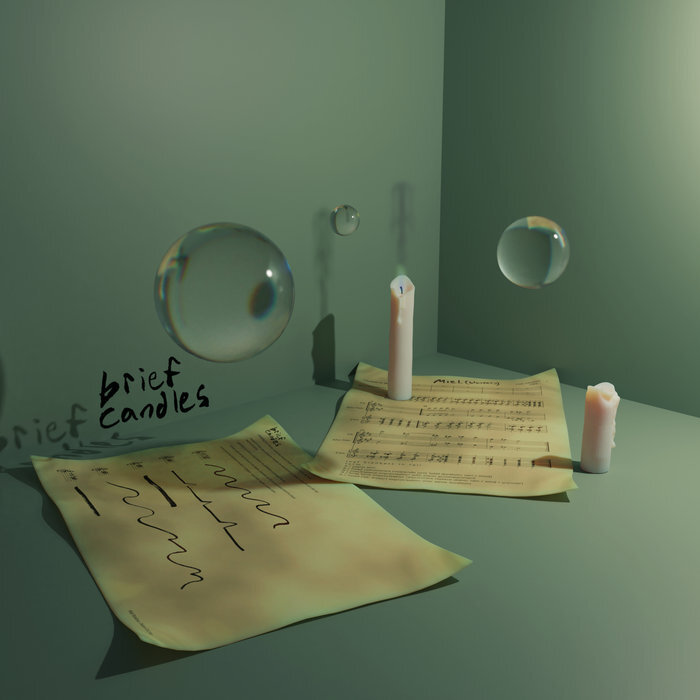by Leah B. Levinson (@littlest_b_)
Words fall out of lips, trumpets ring like strings, and songs arise from dust on Matt Robidoux’s latest. On Brief Candles, Robidoux moves seamlessly between a melodically grounded, somber instrumental compositional style to an ensemble format that carries rock and pop tunes with joy and lightness. These frameworks bleed into one another and their affects intertwine. We are moved between the two without a sense of culture shock or an ounce of irony tasted. The overall effect is of an album breathing itself into form.
Robidoux’s solo work has spanned from fuzzed out bedroom rock records to surrealist critical interrogations of race from the point of view of his own Irish descent. The former finds reprise at the end of Brief Candles when a 2017 track, “Sunny Rain,” is joyfully and fruitfully revisited, delivering us to landing with the singalong psychedelic joy of a Their Satanic Majesties' Second Request-era Stones jam or a Loaded-era Velvet Underground tune. Robidoux conveys a deep earnestness even when swinging large and because of this, his sense of levity sits comfortably alongside and compliments his work exploring the latter, heavier themes of race and heritage. Irish Collection (2017) and Irish Need Not Apply (2019) are vulnerable and honest excavations into the trappings of both ethnic solidarity and oppression. By mining Irish and Irish-American cultural exports for source material—alternately connecting himself to his heritage and distancing himself from it—Robidoux traces the shaky line between pride and insularity, oppressed and oppressor.
Brief Candles contains nothing so opaque. Instead, it enters rooms and moves through them, adapting to the light of each space. Repeating structures and open-ended harmonies create space for introspection and for thoughts to wonder. Robidoux adopts jazz harmony into a chamber ensemble setting, matching moods, for me, reminiscent of Los Angeles’ Kneebody; Chicago’s Jason Adasiewicz, Joshua Berman, and Nicole Mitchell; and Seattle’s Bad Luck. This record, however, leans even less on the improvisational and melodic components of jazz than many of those do, focusing instead on arrangement, atmosphere, and texture via production.
In this, it reminds me greatly of Otomo Yoshihide’s New Jazz Orchestra, a large ensemble whose 2005 album ONJO contained renditions of Ornette Coleman and Jim O’Rourke tunes alike, folding the orchestrated aspects of the big band into electronic production techniques. On that album, visceral textures (like Sachiko M’s high, whirring, sustained tones) sit just above repeating musical passages, creating a trance-like haze. On Brief Candles, this effect is revisited so endearingly that, to my ears, the similarity has been uncanny at times. Although I can’t be certain that Otomo Yoshihide’s album is a point of reference for Robidoux, I wouldn’t be surprised, especially because of the willingness and ease with which he folds rock into this ensemble framework, presenting this melding as something actually exciting and worthwhile, hardly displaced.
“Reflection Space” starts with a certain subtlety as cicada-like whirrs sit just above the quietest premonitions of the Kraut Rock-via-Stephen Malkmus to come. As the piece gives way to a long, apathetic-but-inert jam, the high electronic feedback continues to hover alongside trumpet and saxophone, all weaving their way within and outside of the fabric. This track, marking a halfway point, presents an important and gradual getting-there. Coming out of a particularly chamber-oriented passage, it makes the new attention towards songs feel nicely casual and covert. It makes for a small motion, non-presumptuous and avoiding pastiche.
Brief Candles provides an approach to a post-genre concoction that less so does away with the signifiers that genre relies on but, instead, builds from them a new flowing work worth its whole. It’s a digestible album at 37 minutes and eight tracks, but it’s even pace, patient motion, and bevy of styles make it feel expansive, hearty, and renewed with every listen.

